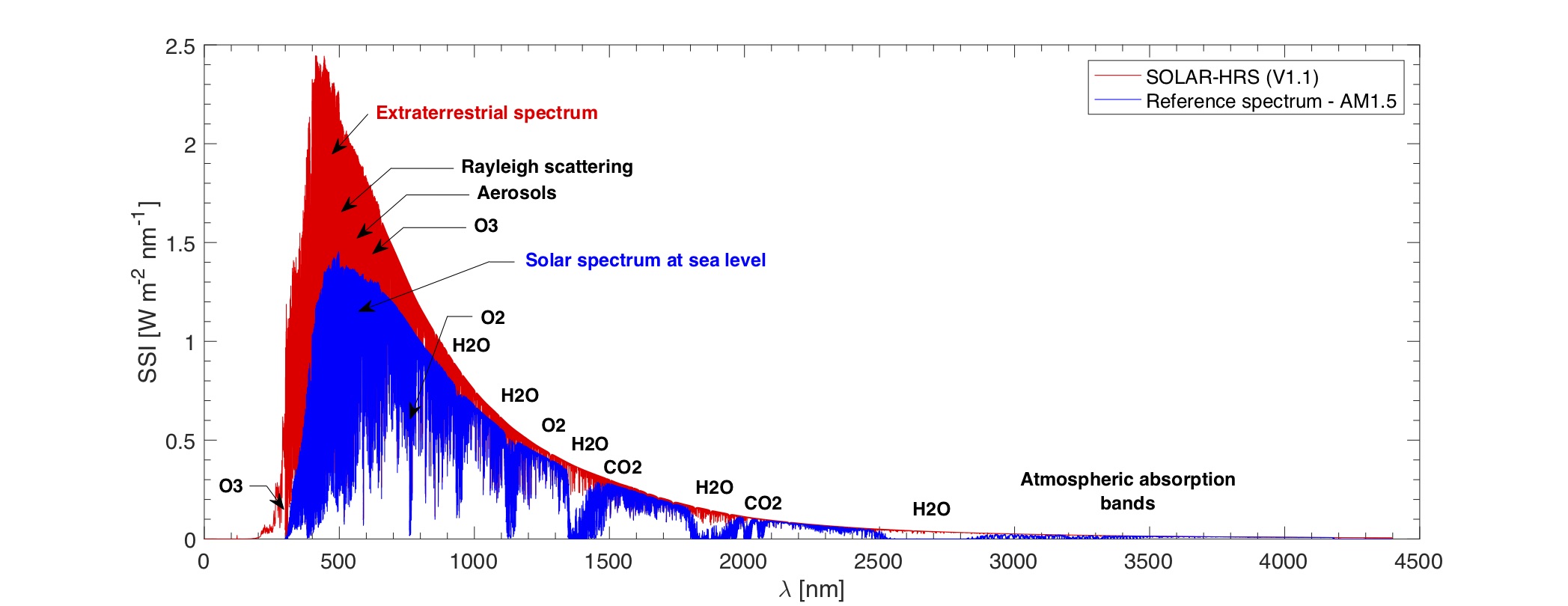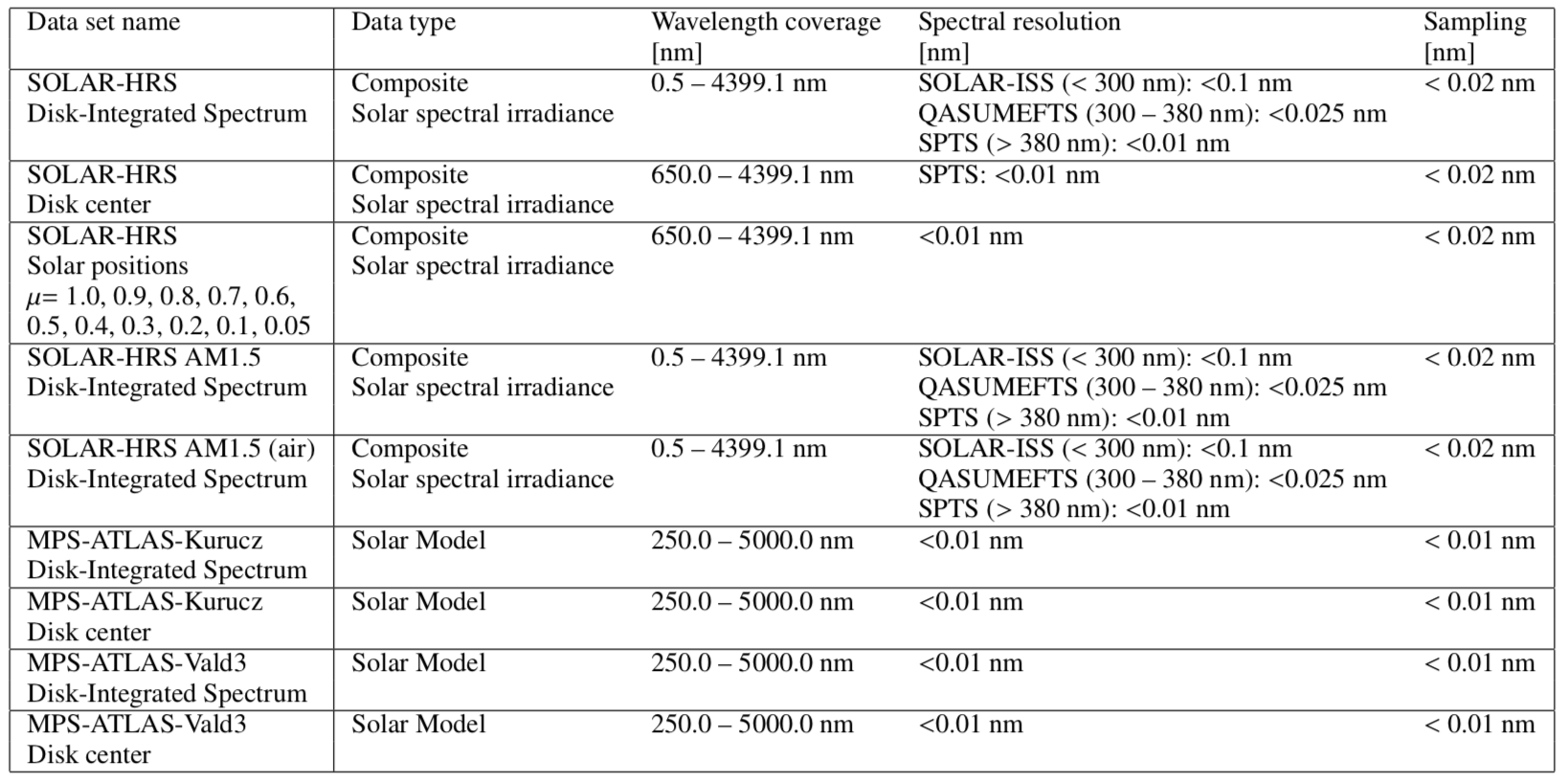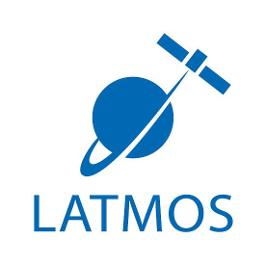
Methods
The HRS disk-integrated solar spectrum is based on SOLAR-ISS reference spectrum (absolute determination from 0.5 to 3000 nm), QualityAssurance of Spectral Ultraviolet Measurements In Europe Fourier Transform Spectrometer (QASUMEFTS) solar irradiance observations (from 300 to 380 nm), and solar pseudo-transmittance (from 300 to 4400 nm). The solar pseudo-transmittance spectrum (Toon, 2014) is obtained from an empirical solar linelist, which have been generated by simultaneous fitting of ATMOS, MkIV, Kitt Peak, Denver U, and TCCON spectra and by a telluric absorptions fit using the HITRAN linelist (any remaining airmass-independent absorptions were attributed to the Sun).
The same approach is used to obtain the HRS disk-center solar spectrum, which is based on solar pseudo-transmittance spectrum for disk-center (Toon, 2014).
The 1D MPS-ATLAS solar spectra (with Kurucz or Vald3 linelists) are based on the Merged Parallelised Simplified ATLAS code (Witzke et al., 2021). From solar parameters (Teff, log g, Fe/H+ abundances, …), MPS-ATLAS calculates solar spectra together with their centre-to-limb variations (CLV). Then, we can obtain disk-centre and disk-integrated spectra. From solar models, we obtained several solar spectra for eleven different solar view-angles from μ = 1.0 to μ = 0.05. Based on solar models, we deduce the HRS solar spectra for ten different solar view-angles from μ = 0.9 to μ = 0.05. Temporal extents Solar minimum - April 2008 / December 2019
Data access Publications [1] Meftah M. et al., 2022 (under preparation) Contacts Principal Investigator/Owner: Mustapha Meftah (LATMOS/IPSL, Sorbonne Université, UVSQ, CNRS)
Mustapha.Meftah@latmos.ipsl.fr Co-Investigator: Sarkissian Alain (LATMOS/IPSL, Sorbonne Université, UVSQ, CNRS)
Alain.Sarkissian@latmos.ipsl.fr Other (DOI manager): Reberac Aurélie (LATMOS/IPSL, Sorbonne Université, UVSQ, CNRS)
Aurelie.Reberac@latmos.ipsl.fr Dataset information Howto cite
The various new high-resolution solar reference spectra derived from this work and listed below can be downloaded from the VOSCAT portal:

doi = 10.21413/SOLAR-HRS-DATASET.V1.1_LATMOS
url = https://doi.org/10.21413/solar-hrs-dataset.v1.1_latmos
(APA style)
Meftah M. (2022). SOLAR-HRS: High-resolution extraterrestrial solar Reference Spectra for disk-integrated, disk-center, and intermediate cases (Version 1.1) [Data set]. LATMOS. https://doi.org/10.21413/SOLAR-HRS-DATASET.V1.1_LATMOS
(BibTex style)
@misc{https://doi.org/10.21413/solar-hrs-dataset.v1.1_latmos,
doi = {10.21413/SOLAR-HRS-DATASET.V1.1_LATMOS},
url = {http://doi.latmos.ipsl.fr/DOI_SOLAR_HRS.v1.1.html},
author = {Meftah, Mustapha},
title = {SOLAR-HRS: The HRS high-resolution extraterrestrial solar reference spectra for disk-integrated, disk-center, and intermediate cases},
publisher = {LATMOS},
year = {2022}
}




